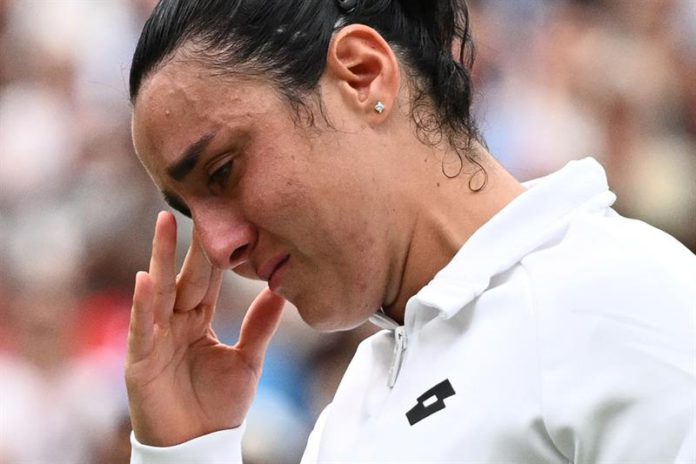There was Andy Murray in 2012, Jana Novotna in 1993 and Roger Federer in 2008.
Centre Court has seen the highs but this intimate amphitheatre, a cosy living room of a sporting arena, also exposes those crushing lows.
Like those before her, the raw emotion poured out of Ons Jabeur as she broke into tears – beaten in the Wimbledon women’s final for the second year in a row.
“I will try but this is very, very tough,” the Tunisian said as she stepped up to speak after her 6-4 6-4 defeat by Marketa Vondrousova.
You could not help but think back to Britain’s Murray, who 11 years earlier stood in the very same spot as he sobbed “I’m going to try this and it’s not going to be easy”.
Or to Novotna 30 years ago when she cried on the shoulder of the Duchess of Kent – one of Wimbledon’s most iconic moments. This time Jabeur was comforted by the Princess of Wales.
“She didn’t know if she wants to give me a hug or not,” Jabeur, 28, said. “I told her hugs are always welcome from me.”
It felt like it was going to be Jabeur’s year.
She served her time in last year’s final when she took the first set before being beaten by Elena Rybakina. Throughout that run she had had the Venus Rosewater dish as the image on the lockscreen on her phone.
This year, the lockscreen changed to her niece and nephew, the ghost of Rybakina was banished in the quarter-finals over three tight sets.
Aryna Sabalenka, this year’s Australian Open winner, was beaten amid a wave of momentum in the semi-finals with Jabeur seemingly on course to become the first African or Arab woman to win a Grand Slam singles title.
But instead, Jabeur’s old-school style – she smiles as she crafts points with spins and slice – was tied up in a straightjacket of nerves.
Her grip was clenched, her shoulders tight and unseeded Czech Vondrousova won, inflicting Jabeur’s third Grand Slam final defeat in as many attempts.
“I think this is the most painful loss of my career,” Jabeur said, who lost the US Open final two months after last year’s Wimbledon disappointment.
As the words left her mouth, a crowd who had already embraced her held out its arms and pulled her in tight with a cheer.
Jabeur’s husband, usually her straight-faced fitness trainer, wiped away the tears in the players’ box.
“It’s going to be a tough day for me today,” Jabeur said.
Jabeur sat disconsolate in her seat courtside as Vondrousova paraded the winner’s trophy in front of the flashing cameras.
Soon Jabeur disappeared for the solace of the locker room. There she cried with four-time Grand Slam champion Kim Clijsters, who suffered similar heartbreak on the biggest stage – losing four finals before winning her first major in 2005.
Clijsters knows exactly how this feels.
Ninety minutes after the final point, Jabeur made her way to her news conference with her hood pulled up as she tried to hide her emotion from the world.
As she crossed the players’ balcony she was spotted by a group of Tunisian fans who proceeded to sing her name.
Jabeur paused, looked to the sky, and the tears flowed again.
“It’s painful because you feel so close to achieving something that you want, and actually back to square one,” she said, her eyes still red with emotion and a tissue never far away.
“I didn’t play good. So many things that I should have maybe done. Not serving well did not help. My backhand wasn’t here today.”
Clijsters will be an obvious example for Jabeur to follow.
“It’s the toughest part about sport,” the Belgian told BBC Radio 5 Live.
“Ons was the favourite today. She will question why she is overwhelmed with all these negative emotions when she gets to the big stages of a tournament.”
After the defeats for Murray, Federer and Novotna, the glory also followed for them on the Wimbledon grass.
Murray went on to win the title a year after his 2012 tears, while Novotna lifted the trophy five years after her loss and Federer went on to win three more after the 2008 defeat by Rafael Nadal.
“It is going to be a tough day today for me. [I am] not going to give up. I will come back stronger and win a Grand Slam one day,” Jabeur said.
“I want to thank my team for always believing in me. We are going to make it one day, I promise you.”
Jabeur will hope her Wimbledon story will be the same as the greats before her.

